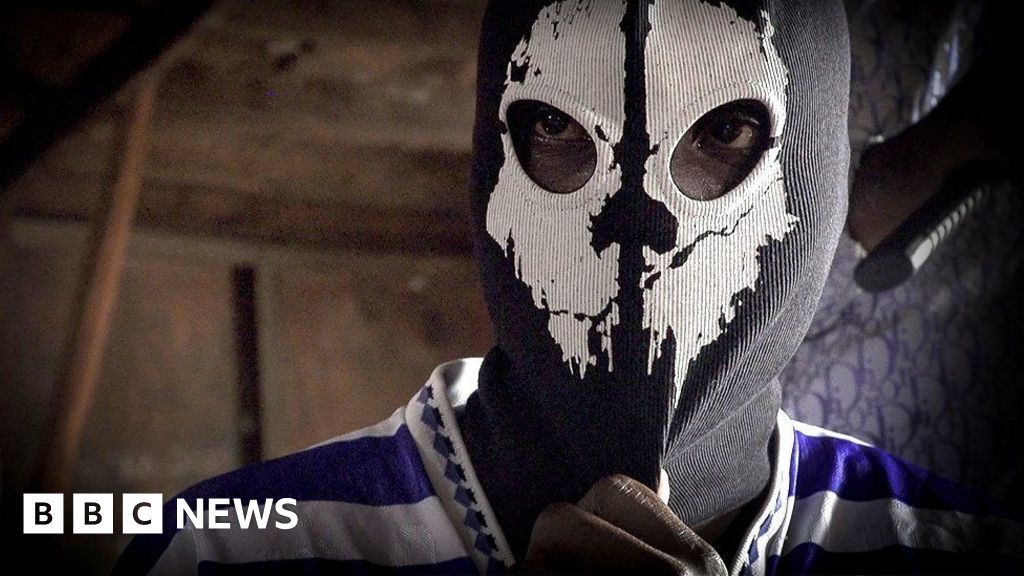Interpol
Operation to crack down on Black Axe gang included arrests in Switzerland
Police forces from around the world are joining forces in a series of covert operations targeting one of West Africa’s most feared criminal networks, the Black Axe.
Operation Jackal III involved officers wearing bulletproof vests carrying out raids in 21 countries between April and July 2024.
The operation, coordinated by the international police agency Interpol, led to the arrest of 300 people with links to Black Axe and other associated groups.
Interpol called the operation a “major blow” to the Nigerian criminal network but warned it remained a global threat due to its international reach and sophisticated technology.
In one notorious example, Canadian authorities announced they had uncovered a money laundering scheme worth more than $5 billion (£3.8 billion) linked to Black Axe in 2017.
“They are very organised and systematic,” Kaya Chih-shin, a senior official at Interpol’s Financial Crime and Corruption Centre, told the BBC.
According to a 2022 Interpol report, “Black Axe and similar groups are responsible for the majority of cyber-enabled financial frauds around the world, as well as many other serious crimes.”
Kaya said innovations in money transfer software and cryptocurrencies play into the hands of the group known for running multi-million dollar online frauds.
“These criminal organisations are quick to adopt new technology, and developments in fintech have made it much easier to move funds illicitly around the world,” he said.
Operation Jackal III was years in the planning and led to the seizure of $3 million in illicit assets and the freezing of more than 700 bank accounts.
Many of Black Axe’s members are college educated and are recruited while still in school.
The organization is a secret criminal network operating in human trafficking, prostitution and murder around the world.
Cybercrime targeting individuals and businesses is the organization’s primary source of revenue.
Since 2022, multiple so-called “Jackal” police operations have been carried out.
These cross-border raids have resulted in the arrest of dozens of members of Black Axe and other gangs and the seizure of their electronic devices, allowing Interpol to create a vast database of information that is now shared with officials in its 196 member countries.
“We need to get the data and compile the findings to understand the modus operandi of these countries,” Kaya said.
Interpol
Swiss police were filmed carefully examining the contents of the properties they searched.
Despite several international arrests, some experts feel not enough is being done to tackle the roots of these criminal organisations in West Africa.
“The focus needs to be on prevention rather than direct operations against these criminal groups,” said Dr Oluwole Ojewale, West Africa regional coordinator for the Institute for Security Studies.
Nigeria, which has seen widespread anti-corruption protests in recent weeks, is one of Africa’s largest economies but also home to 87 million people living below the poverty line, according to the World Bank. It is also a major recruiting base for Black Axe.
Interpol said it was conducting training exercises with key Nigerian officials and police officials, but corruption and allegations of collusion between Black Axe and local authorities remain major obstacles.
“It is the politicians who are actually arming these boys,” Dr Ojewale said. “The overall failure of governance in the country is putting pressure on people to enlist. [into Black Axe].”
Interpol’s Operation Jackal, which now operates worldwide, has its origins in Ireland.
Following a series of police investigations by the Garda National Economic Crime Bureau (GNECB) in 2020, a small number of Black Axe members were arrested, paving the way for the exposure of a much wider network.
“They operated very discreetly and unobtrusively,” said Detective Superintendent Michael Cryan of the GNECB, who led the investigation.
“The amount of money laundered through Ireland is astronomical,” he added.
Interpol
Interpol has released photos of mobile phones seized in raids in South Africa.
Police have since identified 1,000 people in Ireland linked to Black Axe and arrested hundreds on suspicion of fraud and cybercrime.
“Bank robberies are now carried out using laptops and have become much more sophisticated,” Superintendent Cryan said.
He estimates that €200 million ($220 million, £170 million) has been stolen online in Ireland in the past five years, but this represents just 20 percent of all reported cybercrime.
“This is not a typical crime, not a normal crime … the people making the decisions need to know how serious this is,” he said.
An investigation by Irish police in November 2023 revealed that cryptocurrencies, which allow for quick transfers between digital wallets around the world, are becoming an essential component of Black Axe’s money laundering operations.
More than 1 million euros worth of crypto assets was seized in one operation.
To address these innovations, INTERPOL has deployed its own new technology, launching the Global Rapid Payment Intervention System (I-GRIP).
The mechanism allows authorities in member states to freeze bank accounts around the world with unprecedented speed, and was used to thwart a $40 million fraud targeted at a Singapore company last month.
Interpol’s Kaya said such technology would make it harder for criminals to move funds across borders with impunity.
A major effort is underway by police forces around the world to collect and share intelligence on Black Axe and other West African criminal organisations.
“Once we can collect this data, we can take action,” he said.
You may also be interested in:
Black Axe: Inside Nigeria’s Most Dangerous Cult
Getty Images/BBC
Source link



